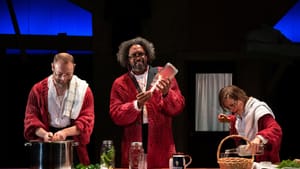Stay in the Loop
BSR publishes on a weekly schedule, with an email newsletter every Wednesday and Thursday morning. There’s no paywall, and subscribing is always free.
Welcome back to the Wilma
The Wilma presents New Saloon’s Minor Character

Saturday night, October 9, 2021 at the Wilma Theater. It’s the premiere of Minor Character, an adaptation of Uncle Vanya, directed by Yury Urnov. For the first time in 20 months, there is an in-person opening night. The buzz in the audience is audible, and heightens when the artistic team steps onstage.
They welcome us back and talk about the theater’s long road to this night. From the right side of the audience, you can hear murmurs of assent, and from the center knowing laughter. It quickly becomes obvious that this is a celebration. The Wilma is back, baby! The excitement builds as we realize that this was not a given, but the result of hard work and more than a little luck.
It is Chekhov, after all
The piece opens, and it matches the energy in the room. Outrageous, surreal, ridiculous, and broadly played, it gives us a chance to thank the cast with our laughter and audible responses—a spontaneous and heartfelt reaction. Urnov’s choice here is brilliant, and the conceptual framework of six translations of Uncle Vanya performed simultaneously gives the cast a chance to show off their mastery of wildly varying forms—a Richard Forman-esque feeding of lines from one group of actors to another, a beautiful a cappella piece, even a bit of audience participation. You can almost hear the audience buying in as we collectively realize that this is going to be fun, a concept that seems almost transgressive during our current hellscape. The energy in the room is an unspoken desire that is half demand and half plea: we forgot how good having fun feels. Give us more! Sadly, this is where the piece trips over its own feet.
Humans are meaning-makers, and a theatrical performance is that action distilled to its very essence. In the last 20 months, we have discovered that life is more brutish and shorter than most Americans could have imagined, and that anyone can die at any time. This realization has made theater-makers even more committed to making sure the point of the work communicates clearly. At the same time, Anton Chekhov (the original author of Uncle Vanya) is the most moralistic of the great Northern Hemisphere playwrights, and this combination equals the death of fun. Urnov switches modes, diving into this emotional morass, and I felt the opening-night audience deflate in the face of such sudden solemnity. Playtime is over, now back to real life, the directorial choice says. Instantly, we collectively remembered that this is a Chekhov play, after all.
In fairness, the more serious scenes are fully realized and beautifully rendered, and in a more conventional version would have been highlights of the work. The problem is that the piece begins with a spectacular pavlova, and now you are giving us goulash. It doesn’t matter how tasty the goulash is because you have activated our dessert mode. Anything else is a letdown.
Play and despair
Per usual, the Wilma Hothouse cast turn in stellar performances, but I’d like to give a tip of the ol’ ushanka to Lindsay Smiling as Waffles, who demonstrated remarkable comic timing in a tricky role. Michael Kiley’s sound and J. Dominic Chacon’s lighting serve the play well. As in many of the Wilma’s recent works, there’s a video component, including a large video screen on the back wall. The video work is stellar and left me wanting more.
There is one directorial choice that encapsulates my frustration with the show. A character stands onstage with a boom box, trying out various songs to underscore the next scene. An 80s pop hit? A 90s ballad? Nope. The original recording of Hallelujah by Leonard Cohen, which is by far the sparest and most desolate rendition of that song.
Urnov’s vision is clear and well-executed, despite my issues with his choices. The piece rediscovers its zaniness and sense of play near the end, which made me even more frustrated by the bleakness I had to endure to get there. At 111 minutes, this piece is not the longest the company has performed in the last few years, but with no intermission and the above-mentioned existential despair, it certainly felt so.
Is this a good play worth the ticket price? Absolutely, and I can guarantee it will be one of the most interesting performances you will see this year. However, by recent Wilma standards, this is a miss. It had a chance to make a revolutionary statement about the importance of live, in-person performance to Philadelphia, and instead delivered a fascinating piece of theater. In terms of the Wilma’s oeuvre, Minor Character is a minor work.
What, When, Where
Minor Character: Six translations of Uncle Vanya at the same time. Based on the play by Anton Chekhov, originally created by New Saloon, with translators Marian Fell, Laurence Senelick, Paul Schmidt, Carol Rocamora, and Google Translate; directed by Yury Urnov. $29-$59. Through October 24, 2021, at the Wilma Theater, 265 S. Broad Street, Philadelphia. (215) 546-7824 or wilmatheater.org.
All audience members are required to be masked throughout, and bring proof of vaccination and ID for checking at the door. There is a ticket reader able to read both QR codes and physical tickets, making the entrance into the theater touchless. There are no physical programs. Programs can be accessed by scanning the QR code on the back of the seat in front of you (or on the floor if you are in the front row).
Accessibility
The Wilma is wheelchair-accessible, and a new renovation has made the lobby easier to navigate. The wheelchair-accessible seating is on the right-hand side of the theater, in the very back, immediately after you enter.
Sign up for our newsletter
All of the week's new articles, all in one place. Sign up for the free weekly BSR newsletters, and don't miss a conversation.

 Brad Rothbart
Brad Rothbart